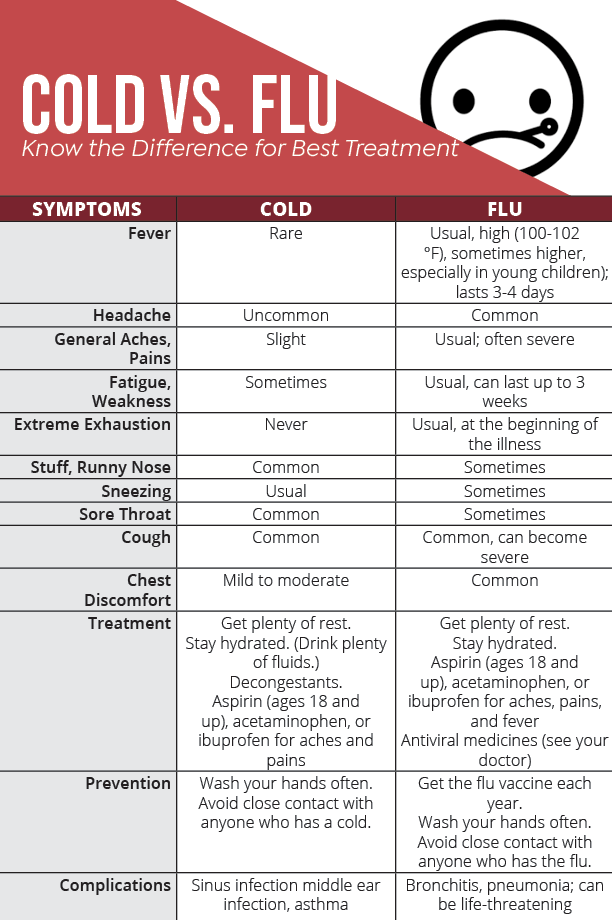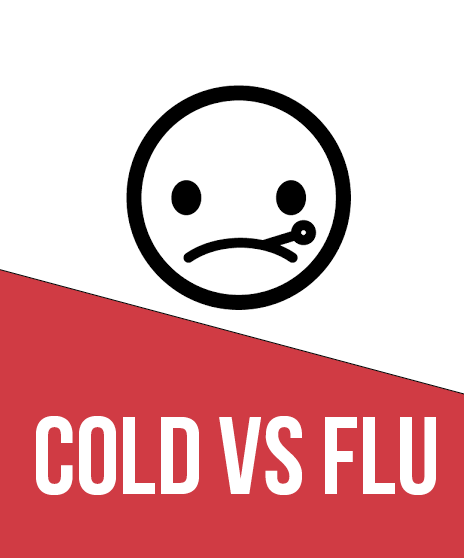It’s that time of year again. Coughing, sneezing, your nose is running, and maybe you are feeling a bit run down or achy. How do you know if it’s a cold or the flu? Both the common cold and the flu are highly contagious respiratory illnesses caused by different viruses. It may be difficult to tell them apart because both illnesses can have similar symptoms; however, the common cold is typically much less severe than the flu.

Flu symptoms typically have an abrupt onset and often include fever, chills, headache, fatigue, body aches, cough, sore throat and a runny or stuffy nose. Some people may even experience vomiting and diarrhea. Typical cold symptoms are often more gradual in onset, milder, and fever is usually rare. Colds generally do not result in serious health problems, but the flu can have very serious complications including pneumonia, bacterial infections, hospitalizations and even death.
Both the flu and common cold are caused by viruses and are not treated with antibiotics. There is no cure for the common cold and treatment goals include supportive care to help you feel better. Getting enough rest is crucial to your recovery. It is also important to drink plenty of fluids to prevent dehydration. Tylenol works well for body aches and fever unless you have a specific allergy to this medication. If you have a sore throat, you may want to gargle with warm salt water. If you have any health issues, be sure and talk with your doctor before taking any over-the-counter cold and flu medications. For example, the common decongestant, pseudoephedrine, may increase blood pressure and heart rate.
The flu is treated with the same supportive measures as the common cold, but sometimes-antiviral drugs may be a treatment option. If you think you may have the flu, it is important to get into your health care provider within 48 hrs. Antiviral medications are most effective when initiated early in the illness. Antiviral drugs can often lessen the symptoms and shorten the duration of your illness by 1 to 2 days and can prevent complications.
Most people with the flu do not require medical care, but some people are at high risk of developing serious flu related complications. This includes people 65 years and older; children younger than 5 years of age; people with certain chronic medical conditions such as chronic lung disease or diabetes; and pregnant women.
Here are some tips for avoiding the cold and the flu this season:
- Get a flu shot – The Centers for Disease Control and Prevention (CDC) recommends everyone 6 months of age or older be vaccinated annually against influenza particularly in high risk populations.
- Practice good hygiene and wash your hands frequently with soap and warm water.
- Avoid getting close to people who are sick.
- Avoid touching your nose, eyes, and mouth when they are not freshly washed, as those are the most common places for germs to get in.
- Keep your surroundings clean.
- Use alcohol-based sanitizer if soap and water is not available. Have it on you at all times.
- Studies have shown that zinc lozenges can shorten the length of colds if taken within 24hrs of showing symptoms.
- Practice good health habits. Be sure to eat a well balanced diet with plenty of fresh fruits and vegetables, get 8-10 hours of sleep at night (when we are tired, your body does not fight as hard), exercise regularly (enhances immune function), and make efforts to manage stress.
- Quit smoking. It damages your respiratory tract and increases the risk of infections


